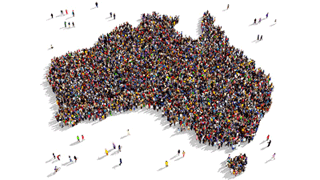Quote Of The Week
“We shouldn’t try to control asset prices. What we can influence is how much borrowing happens on the back of those rising prices. We would be concerned if there were to be a deterioration in these standards, but there are few signs of this at the moment.”
RBA governor Phillip Lowe
ABS Data Confirms Migration
 Australian capital cities have witnessed the biggest loss of people into the regions on record.
Australian capital cities have witnessed the biggest loss of people into the regions on record.
The ABS has confirmed the Exodus to Affordable Lifestyle trend with the release of quarterly figures showing the movement of people around Australia.
Economists are calling the escape to the regions a “stampede” and overwhelmed real estate agents are calling the demand on regional properties a boom. CoreLogic data shows regional home prices, on average, rose 8% over the year to January – the biggest jump in 16 years.
The ABS data shows capital cities saw their biggest quarterly loss of people from internal migration on record, with 11,247 people leaving capital cities and moving to regional areas.
Sydney had a net loss of 4,700 people to the rest of the state, building on the 3,700 from the previous quarter. Melbourne also had a net loss of 4,700 people to the rest of the state. Brisbane went against the trend with a net gain of 230 people from the rest of the state, while Perth had a net gain of 710.
RBA Won’t Act On House Prices
 RBA governor Phillip Lowe has said the Reserve Bank is not responsible for targeting house prices, after questions were raised about the creation of a boom market against the backdrop of low interest rates.
RBA governor Phillip Lowe has said the Reserve Bank is not responsible for targeting house prices, after questions were raised about the creation of a boom market against the backdrop of low interest rates.
“The RBA does not, and should not, target housing prices – instead, our focus is on the lending that is used to purchase housing,” Phillip Lowe said in front of parliament’s standing committee on economics.
Questioned about the point at which the RBA will act to prevent the creation of “unsustainable prices”, Lowe said the issue for the central bank would be if people didn’t borrow sensibly.
“We shouldn’t try to control asset prices,” he said. “What we can influence is how much borrowing happens on the back of those rising prices. We would be concerned if there were to be a deterioration in these standards, but there are few signs of this at the moment.”
Last week, the RBA confirmed that it will keep the cash rate at 0.1% and revealed that the interest rate will likely remain at a record low until 2024 at least.
Low Listings Help To Push Prices
 SQM Research has calculated national residential property listings decreased in January by 2.9%, falling from 272,999 in December to 265,116. Compared to 12 months ago, listings were down by 10.5%, which is putting upward pressure on prices, given high buyer demand.
SQM Research has calculated national residential property listings decreased in January by 2.9%, falling from 272,999 in December to 265,116. Compared to 12 months ago, listings were down by 10.5%, which is putting upward pressure on prices, given high buyer demand.
All capital cities experienced seasonal decreases in property listings over the month except for Perth. The largest decrease was 4.7% in Melbourne.
Year-on-year listings also show larger declines for most capital cities with the exception of Sydney (up 4.5%) and Melbourne (up 21%). Nationally, new listings decreased by 24% over the course of January with 16,234 fewer properties on the market.
Hobart’s new listings decreased 33%, followed by Canberra which dropped 26%. Sydney recorded the lowest decrease in new listings of 2%.
The month of January traditionally records falls in properties listed for sale as the market is still in holiday mode, SQM’s Louis Christopher says.
Auction Results Suggest Higher Prices
 More signs are pointing to higher prices across Australia’s super-tight housing market this year as the stampede to snap up properties continues.
More signs are pointing to higher prices across Australia’s super-tight housing market this year as the stampede to snap up properties continues.
CoreLogic auctions data released on Monday shows a preliminary clearance rate of 84% across the combined capital cities last week, up from 81% the previous week. More homes went under the hammer, with 1,287 auctions compared with 884 the week prior.
Sydney was a standout performer, with a clearance rate of 89%, compared to 77% a year ago. In Geelong and Sydney’s inner west, every single property that went to auction was sold, the preliminary figures showed. Other strong sub-regions included NSW’s Central Coast and Sydney’s Northern Beaches.
Across the smaller markets, Canberra returned the highest preliminary clearance rate of 93%, followed by Adelaide 83%, Perth 75% and Brisbane 75%.
“Such strong auction results signal further upwards pressure on housing prices amidst extremely tight advertised supply levels and above average buyer demand,” CoreLogic said.
Banks Back New Lending Laws
 The big banks claim the planned rollback of responsible lending laws will help customers, saying it will lead to faster loan approvals by cutting the amount of detail consumers must provide on their living expenses.
The big banks claim the planned rollback of responsible lending laws will help customers, saying it will lead to faster loan approvals by cutting the amount of detail consumers must provide on their living expenses.
The Federal Government is proposing changes that would mean banks are no longer subject to responsible lending obligations. It says it will make it faster for consumers to access credit, while borrowers will still be protected through other regulations on banks and redress schemes.
Commonwealth Bank, Westpac and National Australia Bank have backed the changes, saying they will remove barriers to credit.
NAB says it will continue to assess if customers can repay their loans without falling into hardship. It says lending currently is being slowed down by requirements for banks to collect too much information about customers’ living expenses.
CBA says banks are currently asking for information that customers find “burdensome” to provide, but the data does not provide a useful guide on a customer’s ability to repay a loan.




